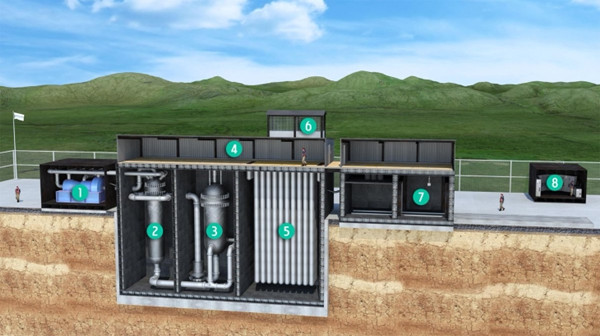The UK government has announced an investment of GBP40 million (USD50 million) in the development of advanced modular reactors (AMRs) and small modular reactors (SMRs). A government-commissioned report, meanwhile, has made recommendations for boosting the capability of the UK's nuclear R&D sector and domestic supply chain to support future AMR deployment.

An artistic impression of a plant based on the U-Battery high-temperature gas-cooled reactor (Image: U-Battery)
Three-quarters of the funds will support three SMR projects. Oxfordshire-based Tokamak Energy, working with industry partners and research establishments including Oxford University, is developing fusion reactors. Lancashire-based Westinghouse is developing a lead-cooled fast reactor, while Cheshire-based U-Battery is working on a small high-temperature gas-cooled reactor. Each project will receive about GBP10 million. This funding was awarded following the companies' successful participation in Phase 1 of the AMR competition, which sought to determine the feasibility of, and provide support for, the design and development of AMR designs.
The remaining GBP10 million will be invested in "unlocking smaller research, design, and manufacturing projects to create up to 200 jobs", the Department for Business, Energy and Industrial Strategy (BEIS) said. GBP5 million of that will be invested in British companies and start-ups, developing new ways of manufacturing advanced nuclear parts for modular reactor projects both at home and abroad. The remaining GBP5 million will be used to strengthen the UK's nuclear regulatory regime, "ensuring it remains one of the most robust and safest in the world as the UK looks to develop and deploy advanced nuclear technologies".
The funding is being provided through BEIS's GBP505 million Energy Innovation Programme, which aims to accelerate the commercialisation of innovative clean energy technologies and processes.
"Today's funding will ensure the technology is more attractive to private sector investors, supercharging the development of the industry and creating supply chains feeding future modular reactor developments," BEIS said.
It noted recent research had shown the UK's entire nuclear industry could contribute GBP9.6 billion per annum to the economy and support 130,000 jobs by 2050, as well as create significant export potential for AMR technology.
AMRs, it said, also provide the possibility to diversify the UK's low-carbon energy mix by producing heat for industry and zero-carbon hydrogen, and have already demonstrated the potential to stimulate private investment.
"Advanced modular reactors are the next step in nuclear energy and have the potential to be a crucial part of tackling carbon emissions and climate change," said Minister for Business and Industry Nadhim Zahawi. "Today's investment will immediately create new jobs in Oxfordshire, Cumbria and Lancashire. But through this vital research, the technology could also create thousands more green collar jobs for decades to come."
Boosting R&D and supply chain capabilities
The funding announcement coincided with a report published by the National Nuclear Laboratory (NNL) on the current capability of the UK's nuclear R&D sector and domestic supply chain to support future AMR deployment, and how this can be developed.
Commissioned by BEIS, the NNL's report found the UK R&D sector and the supply chain have a number of development needs which must be met before the UK is able to deploy AMRs.
"It is also interesting to highlight that the current development needs which exist in the R&D and supply chain are not always technology specific but are applicable across multiple AMRs and in some instances SMRs," it said.
The R&D development needs for more developed AMRs include modelling and simulation, fuel and used fuel management, and reactor equipment - particularly instrumentation and control (I&C). More conceptual designs have additional R&D needs which include fundamental materials R&D and reactor equipment development (heat exchangers and pumps).
"Roadmaps produced for each AMR system show that the majority have similar R&D needs, and this is a key observation that could enable the development of several technologies through cross-cutting, targeted R&D programmes."
Current UK capability to support the R&D needs of AMRs is highly variable, the report says. Key barriers to the UK R&D realising domestic and international opportunities include a lack of verification and validation facilities (e.g. environmental test loops, zero-power research or materials test reactors), as well as a lack of suitably qualified and experience personal.
On the supply chain aspect of the report, it was found that key UK manufacturing needs exist across all AMRs. This is driven by a need for domestic facilities able to produce reactor vessels, equipment and high-temperature valves from advanced materials, control rods and fuels. Once the facilities are in place, this can support and develop the domestic supply chain, it suggests.
The report recommends the government continues with "an enabling domestic policy environment for AMRs to support UK's net-zero legislation". It says the UK should identify international programmes or facilities with like-minded nations to pool resources and collaboratively overcome cross-cutting R&D, regulatory and manufacturing needs. It should also continue fission R&D programmes - such as the Nuclear Innovation Programme - as a means to develop fundamental UK skills and infrastructure.
Researched and written by World Nuclear News